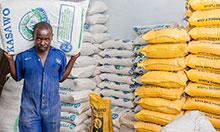The 2015 Fortification Assessment Coverage Tool found that 92 percent of households in Uganda consume maize flour. For school-going children, especially those in boarding school, maize flour is a staple food, served three meals per day for six days each week. However, maize has low levels of vitamin C, iron, zinc, calcium, sodium, and potassium, which are required for healthy growth. Although these could be added by other means, the most cost-effective solution to improve the quality of school-going children’s meals is through food fortification.
SPRING/Uganda developed “For Very Little, Gain More” as an advocacy video to improve school feeding through procurement of fortified maize flour for students’ meals. The video engages school administrators and explains how the use of fortified maize flour can help reduce micronutrient deficiencies that cause poor growth and development and health problems like anemia (especially in adolescent girls). It emphasizes that only a small investment is needed for countless benefits, especially for the learners.

